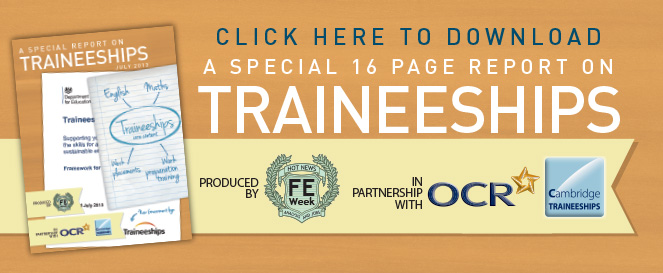Download your free copy of the FE Week 16-page special report on traineeships, sponsored by OCR.
Click here to download (20mb)
Introduction
Since traineeships were first hinted at by deputy Prime Minister Nick Clegg in June last year, the sector has been asking what they will look like, who they will be for and who will be able to provide them.
Now, with just weeks to go until traineeship funding kicks in, some of those questions have been answered.
As FE Week editor Nick Linford explains (page 3), we now know traineeships will combine a high quality work experience placement with maths, English and employability training, will last for anything between six weeks and six months, and will be aimed at unemployed young people who are looking for a job or apprenticeship but lack experience and qualifications.
The scheme was originally announced for 16 to 19-year-olds, but following last month’s spending review, they will also be available for young people aged 19 to 24.
The updated Framework for Delivery announces that 19 to 24-year-olds must have a prior attainment below full level 2, but we await details of the 19 to 24 year-old funding rate for the work placement element from the Skills Funding Agency.
The work placement element is central to the scheme, so on page 4 we hear from colleges on what they think makes for meaningful work experience and how they are drawing on previous experiences to make sure their trainees get the most out of their placements.
Skills Minister Matthew Hancock (page 5), points to Germany’s high number of skilled young people and low unemployment, arguing that traineeships, if implemented well, could play a crucial role in solving the UK’s youth unemployment problem.
Shadow Skills Minister Gordon Marsden (page 5) welcomes the arrival of traineeships saying they could “play a key role in supporting social mobility”. However, he warns “quality must remain paramount in the new traineeships and the Government must monitor their rollout vigilantly”.
On page 6 and 7, Kari Hadjivassiliou, a policy expert from the European Social Fund apprenticeship and traineeship helpdesk tells us how the UK’s programme compares to others.
Many of the questions which remain about traineeships will only be answered through implementation, and Lynne Sedgmore, executive director of the 157 Group takes up this theme on page 10.
Colleges, she says, are “impressively ready… at a system level however, more work is needed” to ensure the programme contributes to building a world class skills system.
Stewart Segal, chief executive of the Association of Employment and Learning Providers (page 10) appreciates the government’s emphasis on quality, but questions whether Ofsted grades should be the only measure of it. He suggests instead that grade three providers could “have a wider set of benchmarks to provide the evidence that they can deliver a high quality programme”.
Ofsted director of learning and skills, Matthew Coffey, explains what it is that Ofsted will be looking for when it comes to inspecting traineeships (page 11).
He says key features will be how well the programme ensures young people can progress, how those with learning difficulties are catered for and “whether the calibre of apprenticeships has improved as a result of traineeships”.
Progression was a prominent theme when providers gathered at a parliamentary debate organised by FE Week to compare notes on their experience of preparation so far, and we’ve got coverage of that event on pages 12 and 13.
Finally on page 14, there’s a sneak peak of what traineeships might look like, as FE Week speaks to providers, employers and tutors in our report from the OCR traineeship pilot scheme.
We also speak to the most important people involved in traineeships, the trainees themselves, about how they feel the programme is helping to turn their lives around and give them a better chance of getting into an apprenticeship or a job.
Despite the many remaining questions about traineeships, there seems to be a lot of positive feeling in the sector about their potential to help young people.
We hope our special report can help you make the most of your preparation time and give you food for thought as traineeships are implemented.
And don’t forget, as always, you can add your own experiences on the FE Week website and tweet us @FEWeek.

